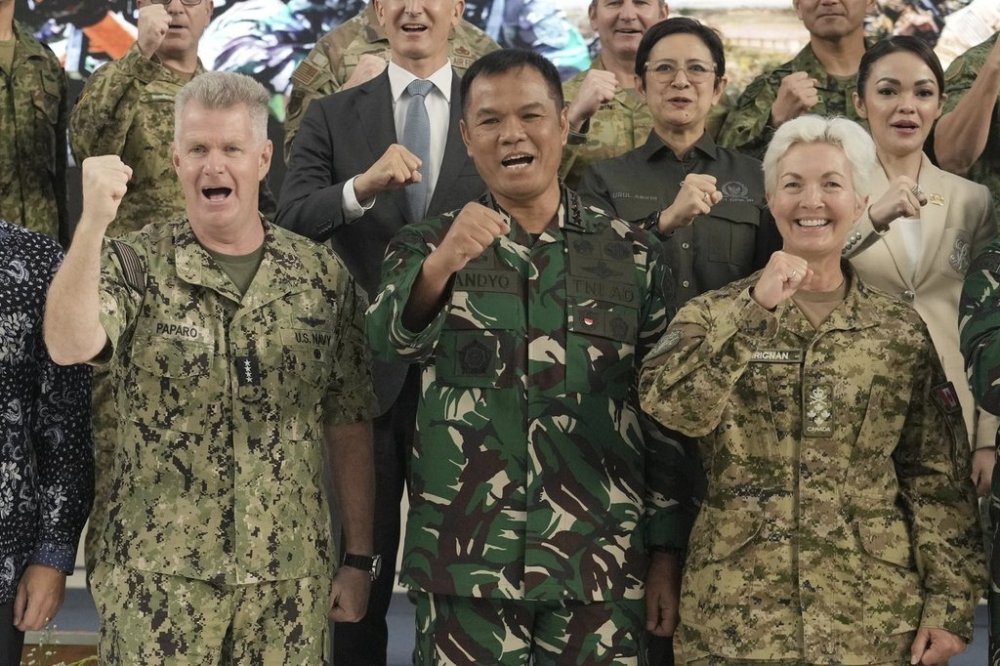Indonesia hosts annual US-led combat drills with Indo-Pacific allies
Advertisement
Read this article for free:
or
Already have an account? Log in here »
To continue reading, please subscribe:
Monthly Digital Subscription
$0 for the first 4 weeks*
- Enjoy unlimited reading on winnipegfreepress.com
- Read the E-Edition, our digital replica newspaper
- Access News Break, our award-winning app
- Play interactive puzzles
*No charge for 4 weeks then price increases to the regular rate of $19.00 plus GST every four weeks. Offer available to new and qualified returning subscribers only. Cancel any time.
Monthly Digital Subscription
$4.75/week*
- Enjoy unlimited reading on winnipegfreepress.com
- Read the E-Edition, our digital replica newspaper
- Access News Break, our award-winning app
- Play interactive puzzles
*Billed as $19 plus GST every four weeks. Cancel any time.
To continue reading, please subscribe:
Add Free Press access to your Brandon Sun subscription for only an additional
$1 for the first 4 weeks*
*Your next subscription payment will increase by $1.00 and you will be charged $16.99 plus GST for four weeks. After four weeks, your payment will increase to $23.99 plus GST every four weeks.
Read unlimited articles for free today:
or
Already have an account? Log in here »
JAKARTA, Indonesia (AP) — Indonesia and the United States began annual joint military exercises on Monday together with forces from a dozen other countries, as the U.S. pushes its allies to take threats from China more seriously.
Hosted by the Indonesian National Armed Forces, this year’s Super Garuda Shield focused on strengthening regional ties in an increasingly unstable global landscape, said Gen. Tandyo Budi Revita, the military’s Deputy Commander.
“It serves as a joint exercise where we stand together to respond every challenge quickly and precisely.” he said in his speech at kick-off ceremony along with Admiral Samuel Paparo, the Commander of the U.S. Indo-Pacific Command.

The exercise has been held annually in Jakarta by U.S. and Indonesian soldiers since 2009. The list of participants expanded since 2022 to include Australia, Japan, Singapore, the United Kingdom, France, Canada, Germany, the Netherlands, New Zealand, Brazil and South Korea, bringing the total number of troops taking part in the drill to 6,500.
Paparo said the expanded participants symbolizes a commitment to partnership and to the sovereignty of each country through mutual respect.
“It represents deterring anyone that would hope to change the facts on the ground using violence with the collective determination of all participants to uphold the principles of sovereignty,” Paparo said.
Jakarta has expressed concern about what it sees as Chinese encroachment on its exclusive economic zone in the South China Sea, while maintaining generally positive ties with Beijing.
Several Asian countries also sent observers to the 11-day combat exercise in Jakarta and on Sumatra island. They will end on Sept. 4 with a combined live-fire drill.
The expanded drills have sparked concern from China, which accused the U.S. of trying to build an “Asian NATO” to limit China’s growing military and diplomatic influence in the region.
During a recent speech in Singapore, U.S. Defense Secretary Pete Hegseth cautioned that seeking U.S. military support while relying on Chinese economic support carries risk.
Hegseth said Washington has been strengthening an arc of military alliances in the Indo-Pacific to reassure allies alarmed by Beijing’s increasing military and economic pressure from China and provocative actions in the disputed South China Sea.
Despite increased activities by Chinese coast guard vessels and fishing boats in the area have unnerved Jakarta, Indonesia has sought to avoid confrontation and continued economic initiatives with China.
Jakarta’s decision to sidestep the issue is consistent with its longstanding policy of keeping friction with Beijing behind closed doors, especially given the scale of Chinese trade and investment in the Indonesian economy, said Muhammad Zulfikar Rakhmat and Yeta Purnama, researchers at the Center of Economic and Law Studies or CELIOS.
“This dual-track diplomacy might seem inconsistent. But for Jakarta, it is strategic. Indonesia is embracing defense diversification, not alignment,” said Rakhmat of CELIOS.
The country has remained committed to Super Garuda Shield and continued purchasing U.S. and French arms and developing interoperability with Western militaries, he added.
“In a region defined by rising tensions and great power rivalry, Indonesia’s refusal to choose sides, at least in defense, might be its strongest asset,” Rakhmat said.

